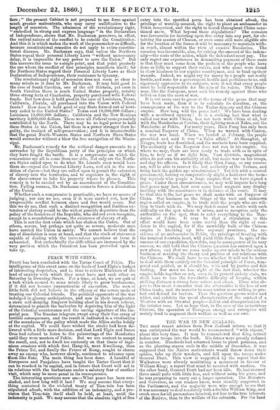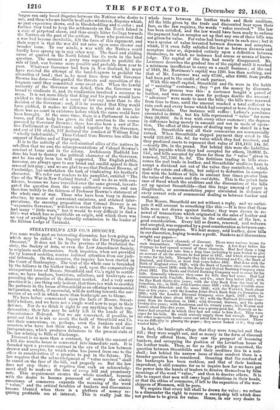THE WAR IN NEW ZEALAND.
THE most recent advices from New Zealand inform us that it was anticipated the war would be recommenced " with vigour," about this very time. It may be remembered that King retired before our troops into the bush. His forces were greatly reduced in number. Hundreds had returned home to plant potatoes, and as the planting season ends in the middle of December, it was supposed that the Native malcontents would throw down their spades, take up their muskets, and fall upon the troops under General Pratt. This view is supported by the report that the Waikatoes were already meditating a movement in favour of William King ; a report that must be received with caution. On the other hand, General Pratt had not been idle. He had stormed three small pahs with little loss, and without using his guns, and he was preparing to carry out a larger operation. The Ministers and Governor, as our readers know, were steadily supported in the Parliament, and the majority were wise enough to see that it was necessary to deal resolutely with a foe like William King, and crush once for all pretensions inimical, not less to the true interests of the Natives, than to the welfare of the colonists. For the land league can only breed disputes between the Natives who desire to sell, and those who are hostile to all sales whatever, disputes which, as past experience shows, end in bloodshedding and murder ; and further they tend to keep the settlements on the North Island in a state of perpetual alarm, and thus create bitter feelings towards the Natives on the part of the settlers. Those who perceived that a war had become inevitable, felt the force of this argument, and their regret is that the war did not arise upon some clearer and broader issue. To our minds, a war with the Natives could hardly have sprung up in any other way. The fixed and abiding cause of quarrel in the North Island has its roots in the land question. The moment a party was organized to prohibit the sale of land, war became more possible and probable from year to year. Whatever Governor had been in New Zealand, he must have resisted the attempt of the land-leaguers to prohibit the alienation of land ; that is, he must have done what Governor Browne has done—disregarded the threats and opposition of the leaguers until they committed some overt• act. When the lawful authority of the Governor was defied, then the Governor was bound to vindicate it, and its vindication involved a recourse to arms. It is not more likely that King and his people would have yielded to the decision of a court of law any more than to the decision of the Governor ; and, if it be assumed that King would have yielded, it makes no difference in the point at issue, for there was no court in existence before which the cause could have been brought. At the same time, there is a Parliament in exis- tence, and that body has given its full sanction to the course pursued by Governor Browne; there has also been a sort of Na- tive Parliament or Conference called together by the Governor, and out of 110 chiefs, 107 declared the conduct of William King " wholly indefensible." Thus Colonel Gore Browne has alike the support of Native and of European.
It is to the activity of the ecclesiastical allies of the natives in rebellion that we owe the misrepresentations of Colonel Browne's conduct at home and in the colony. Archdeacon Hadfield has done his best to destroy the political character of the Governor, and he has only been too well supported. The English public, however, are always open to any broad and candid appeal to their sense of fair play ; and we are glad to see that Professor Browne, of Cambridge, has undertaken the task of vindicating his brother's character. We refer our readers to his pamphlet, entitled " The Case of the War in New Zealand Stated ;" and we do so with con- fidence, because we have travelled over the same ground, investi- gated the question from the same authentic sources, and can therefore testify to the fairness of Professor Browne's statement of the whole case of war. Those who have been busy in demon- stratine, by means of convenient omissions, and strained inter- pretations, the sneering proposition that Colonel Browne is an "expensive Governor," will have to revise their views. We have had many " little wars," but it would be very difficult to find a little war which has so justifiable an origin, and which there was no way of avoiding but by dastardly submission to the leader of the Ribbon Lodge of Taranaki.



























 Previous page
Previous page